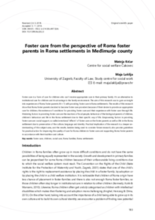Abstract
Foster care is a form of care for children who can’t receive appropriate care in their primary family. It’s an alternative to institutional care for children and its advantage is the family environment. The aim of this research was to gain an insight into experiences of Roma foster parents (N = 7) with providing foster care in Roma settlements. The results of this research show that Roma foster parents decided to become foster care providers because of their desire to provide an appropriate care for children, the existence of conditions for providing foster care and their experience with foster care through life. Hindering factors in providing foster care are the reactions of local people, behaviour of the biological parents of children, children’s behaviour and life in the Roma settlement due to their specific way of life. Empowering factors in providing foster care are: social support, so-called emotional “effects” of foster care on the foster parents as well as life in the Roma settlement due to preservation of the culture, language and identity. Practical implication of the research is a deeper understanding of this subject area, and the results, besides being used to consider future research, also provide guidelines for practical action for improving the quality of care for Roma children in foster care and supporting Roma foster parents in accordance with their tradition and culture

